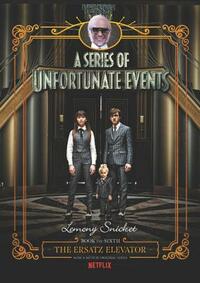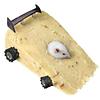You need to sign in or sign up before continuing.
Take a photo of a barcode or cover
I really liked this instalment of Lemony Snicket's plucky, smart, and darkly funny children's series. It seems a lot more satirical than the previous books, which I appreciated as I'm a bit older than the target audience!
Snicket pokes fun at the pointlessness of following what's "in" and what's "out" at any particular moment, as we find the Baudelaires in the care of guardians who are basically slaves to popularity and the newest, "innest" things, and who care far more than is healthy about how outsiders perceive them. From the reader's perspective, the things that the Squalor couple do in the name of being "in" are pretty ridiculous: they wear pinstripe suits all the time, drink aqueous martinis (water in a martini glass with an olive), walk up 66 flights of stairs to their penthouse apartments because elevators are, like, soooo "out". But when we compare them to the things people see as "in" and "out" today, it's definitely a caricature, but is it really so different?
This is also, in part, a condemnation of mindless wealth and greed. Esmé Squalor is pretty much a personification of greed, materialism, and hoarding one's wealth. (This is a common theme with many of the Baudelaires' caretakers: they all, with the exception of Uncle Monty, have a deep character flaw that leads to the manner in which the orphans are discharged from their care.) Here's a taste of both Esmé's personality and that of her husband Jerome, see if you can take a wild guess as to the sort of people they are:
[Side note: the Squalors' apartment has seventy-one rooms!]
But don't think that this is all a social satire, or that it will go over children's heads. Lemony Snicket has really mastered the children's novel, I think, because he doesn't talk down to children- he respects them. His protagonists, the Baudelaire orphans, are almost always smarter, braver, and kinder than their adult caregivers, and that's no coincidence. But, getting back to Ersatz Elevator, this book still made me laugh out loud, and Snicket's wit and wordplay is at top form. At the risk of blockquote-ing you to death, dear reader, here's one of my favourite moments of an interrupting and hilariously oblivious narrator (something this particular author does quite well).
One question I have about this book (and the series as a whole) is, when does it take place? The narrator, Snicket, tells us that the Baudelaires lived "a long time ago." But the Baudelaires' story also mentions credit cards and televisions- so how far in the future is Snicket narrating from?
Looking forward to reading The Vile Village, and FINALLY figuring out what V.F.D. means!
Snicket pokes fun at the pointlessness of following what's "in" and what's "out" at any particular moment, as we find the Baudelaires in the care of guardians who are basically slaves to popularity and the newest, "innest" things, and who care far more than is healthy about how outsiders perceive them. From the reader's perspective, the things that the Squalor couple do in the name of being "in" are pretty ridiculous: they wear pinstripe suits all the time, drink aqueous martinis (water in a martini glass with an olive), walk up 66 flights of stairs to their penthouse apartments because elevators are, like, soooo "out". But when we compare them to the things people see as "in" and "out" today, it's definitely a caricature, but is it really so different?
This is also, in part, a condemnation of mindless wealth and greed. Esmé Squalor is pretty much a personification of greed, materialism, and hoarding one's wealth. (This is a common theme with many of the Baudelaires' caretakers: they all, with the exception of Uncle Monty, have a deep character flaw that leads to the manner in which the orphans are discharged from their care.) Here's a taste of both Esmé's personality and that of her husband Jerome, see if you can take a wild guess as to the sort of people they are:
"We hold the auction at Veblen Hall, and we auction off only the innest things we can find, and best of all, all the money goes to a good cause."
"Which good cause?" Violet asked.
Esmé clapped her long-nailed hands together with glee. "Me! Every last bit of money that people pay at the auction goes right to me! Isn't that smashing!"
"Actually, dear," Jerome said, "I was thinking that this year, perhaps we should give the money to another good cause. For instance, I was just reading about this family of seven. The mother and father lost their jobs, and now they're so poor that they can't even afford to live in a one-room apartment. We might send some of the auction money to people like them."
"Don't talk nonsense," Esmé said crossly. "If we give money to poor people, then they won't be poor anymore. Besides, this year we're going to make heaps of money. I had lunch with twelve millionaires this morning, and eleven of them said they were definitely going to attend the In Auction. The twelfth one has to go to a birthday party. Just think of the money I'll make, Jerome! Maybe we could move to a bigger apartment!"
"But we just moved in a few weeks ago," Jerome said.
[Side note: the Squalors' apartment has seventy-one rooms!]
But don't think that this is all a social satire, or that it will go over children's heads. Lemony Snicket has really mastered the children's novel, I think, because he doesn't talk down to children- he respects them. His protagonists, the Baudelaire orphans, are almost always smarter, braver, and kinder than their adult caregivers, and that's no coincidence. But, getting back to Ersatz Elevator, this book still made me laugh out loud, and Snicket's wit and wordplay is at top form. At the risk of blockquote-ing you to death, dear reader, here's one of my favourite moments of an interrupting and hilariously oblivious narrator (something this particular author does quite well).
The French expression "cul-de-sac" describes what the Baudelaire orphans found when they reached the end of the dark hallway, and like all French expressions, it is most easily understood when you translate each French word into English. The word "de," for instance, is a very common French word, so even if I didn't know a word of French, I would be certain that "de" means "of." The word "sac" is less common, but I am fairly certain that it means something like "mysterious circumstances." And the word "cul" is such a rare French word that I am forced to guess at its translation, and my guess is that in this case it would mean "At the end of the dark hallway, the Baudelaire children found an assortment," so that the expression "cul-de-sac" here means "At the end of the dark hallway, the Baudelaire children found an assortment of mysterious circumstances."
One question I have about this book (and the series as a whole) is, when does it take place? The narrator, Snicket, tells us that the Baudelaires lived "a long time ago." But the Baudelaires' story also mentions credit cards and televisions- so how far in the future is Snicket narrating from?
Looking forward to reading The Vile Village, and FINALLY figuring out what V.F.D. means!
adventurous
emotional
funny
mysterious
fast-paced
Plot or Character Driven:
Plot
Strong character development:
No
Loveable characters:
Yes
Diverse cast of characters:
No
Flaws of characters a main focus:
No
An enjoyable instalment in the series although not much is revealed in terms of VFD etc.
dark
lighthearted
mysterious
tense
slow-paced
Plot or Character Driven:
A mix
Strong character development:
No
Loveable characters:
No
Diverse cast of characters:
No
Flaws of characters a main focus:
Yes
Again I am just listening to these via audiobook so I can hit my reading goal, so far this series has just been going downhill for me. Like how many times can this guy try to capture these kids and fail again so many times at this point he should really just give up and let the kids be. I feel like maybe If I was younger let's say 8-10 I would have probably enjoyed these books. This series is also very repetitive and I feel like nothing new happens in the books it's the same story line over and over again. Maybe I'll listen to the rest of the audiobooks maybe I won't it depends how I feel and if I want to put myself through that. Happy Reading!!!
Starting to worry that Sunny is doing irreparable damage to her teeth.
This has been my favorite of the series so far. I loved the multiple red herrings, and while I was able to guess some of the betrayals I still enjoyed the reveals. I also enjoyed the building mystery surrounding Beatrice, VFD, and the Baudelaire family.
My favorite of the series so far. Predictable as usual but funnier with some well thought out surprises.
challenging
dark
mysterious
tense
fast-paced
Plot or Character Driven:
Plot
Strong character development:
Yes
Loveable characters:
Yes
Diverse cast of characters:
Yes
Flaws of characters a main focus:
Yes
Now we’re getting somewhere! I feel like the last book dragged on but now I’m reinvested in the Baudelaires and the Quagmires. Adding another villain was fantastic and I had completely forgotten about it until the story played out which was fun. As always, it’s so frustrating how useless the adults are in this series especially Mr. Poe! Although the structure of all these books is very formulaic, I think this volume did a great job of reinvigorating the story and all the questions you’re left with make you want to keep reading!
I enjoy the style of writing and there are a lot funny parts.
The only problem is that by now the books have become very formulaic: Orphans meet new guardian, Count Olaf in disguise, nobody believes the Orphans, Mr. Poe is incompetent, Olaf gets away.
Knowing there are 7 mores books until they finally (I am assuming) catch Count Olaf makes it hard to want to read the next in the series. I see why I didn't make it past book 3 when I was a teenager.
The only problem is that by now the books have become very formulaic: Orphans meet new guardian, Count Olaf in disguise, nobody believes the Orphans, Mr. Poe is incompetent, Olaf gets away.
Knowing there are 7 mores books until they finally (I am assuming) catch Count Olaf makes it hard to want to read the next in the series. I see why I didn't make it past book 3 when I was a teenager.
medium-paced






